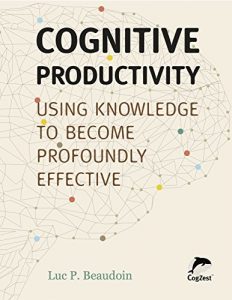The purpose of this book is to help you get lots more out of the "gems of knowledge" to which you have access: Books, web pages, TED talks, podcasts, PDF files, and other sources of knowledge.
Part 1 explains the challenges and opportunities you face when trying to learn with tablets, smartphones and computers. Hint: You're smart, but web browsers, ebook readers and PDF readers are not!
Part 2 conveys a model of the human mind, drawn from cognitive science. This can help you understand yourself. It can also help you become a better processor of knowledge.
Part 3 provides many concrete learning strategies. This is to help you get better at evaluating, choosing, organizing, analyzing and mastering knowledge gems. You'll learn productive new ways of using software, tablets and computers for purposes of learning.
Cognitive Productivity is a modern response to previous books:
1.It takes the opposite approach to Nicolas Carr’s book, The Shallows: What the Internet Is Doing to Our Brains. Cognitive Productivity says: Understand your challenges; and use technology effectively to address them.
2.It is a complement to David Allen’s popular book, Getting Things Done: The Art of Stress Free Productivity. Instead, of being a general productivity book, Cognitive Productivity is laser-focused on using knowledge to become a more effective person.
3.It complements Stephen Covey’s excellent The 7 Habits of Highly Effective People. In a few pages of his final chapter, Covey emphasizes regular, lifelong learning. Cognitive Productivity is entirely devoted to that subject.
4.It also responds to Mortimer Adler still popular 1972 book, How to Read a Book. It uses modern cognitive science and specifically deals with technology.
Cognitive Productivity is a thorough, scientific and practical treatment of information processing. This book is particularly suitable for lovers of knowledge: university students, professionals, scientists and even cognitive scientists who want to "Thrive in the sea of knowledge"™.
Part 1 explains the challenges and opportunities you face when trying to learn with tablets, smartphones and computers. Hint: You're smart, but web browsers, ebook readers and PDF readers are not!
Part 2 conveys a model of the human mind, drawn from cognitive science. This can help you understand yourself. It can also help you become a better processor of knowledge.
Part 3 provides many concrete learning strategies. This is to help you get better at evaluating, choosing, organizing, analyzing and mastering knowledge gems. You'll learn productive new ways of using software, tablets and computers for purposes of learning.
Cognitive Productivity is a modern response to previous books:
1.It takes the opposite approach to Nicolas Carr’s book, The Shallows: What the Internet Is Doing to Our Brains. Cognitive Productivity says: Understand your challenges; and use technology effectively to address them.
2.It is a complement to David Allen’s popular book, Getting Things Done: The Art of Stress Free Productivity. Instead, of being a general productivity book, Cognitive Productivity is laser-focused on using knowledge to become a more effective person.
3.It complements Stephen Covey’s excellent The 7 Habits of Highly Effective People. In a few pages of his final chapter, Covey emphasizes regular, lifelong learning. Cognitive Productivity is entirely devoted to that subject.
4.It also responds to Mortimer Adler still popular 1972 book, How to Read a Book. It uses modern cognitive science and specifically deals with technology.
Cognitive Productivity is a thorough, scientific and practical treatment of information processing. This book is particularly suitable for lovers of knowledge: university students, professionals, scientists and even cognitive scientists who want to "Thrive in the sea of knowledge"™.






